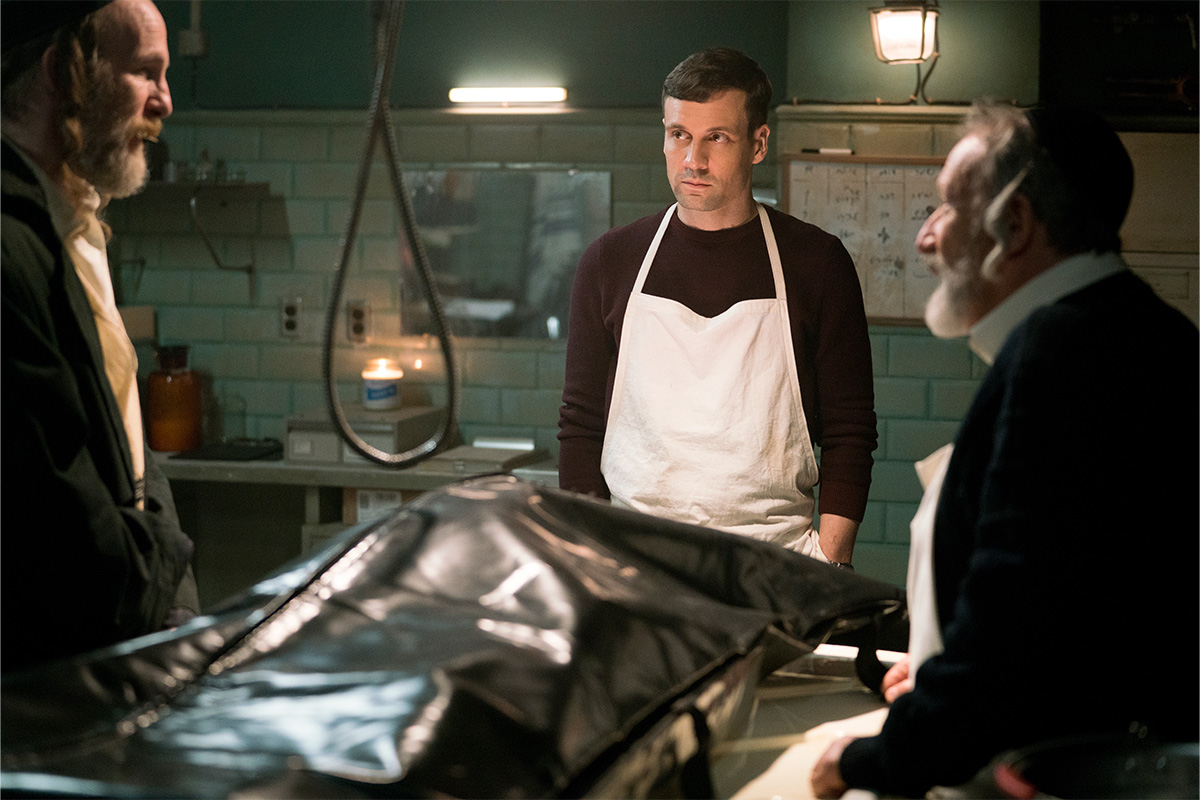We might be in the middle of a new age of Jewish horror: Films like last year’s “Attachment” and 2019’s “The Vigil” explore the rich world of Jewish demonology and mysticism, with scenes in Yiddish to boot. The films echo the stories of spirits and possession from writers like S. Ansky and Isaac Bashevis Singer, employing demons, dybbuks and golems to confront the everyday monsters of modern life.
It was the original “Golem” silent film from 1915 that attracted British filmmaker Oliver Park to the script of “The Offering,” a new Jewish horror film premiering from DECAL on the spookily appropriate date of Friday, January 13th. Park calls the “Golem” trilogy the “first horror franchise,” and he was eager to make his mark in the nascent world of modern Jewish horror. “It was always a dream of mine to work in the Jewish art space,” Park says, noting that the “Golem” series (which was remade by an Israeli team in 2018) was the inspiration for Mary Shelley’s sci-fi horror classic “Frankenstein.”
Writers and producers Jonathan Yunger and Hank Hoffman are both well-versed in the Kabbalah that foments their story’s demon — and in the religious rituals their characters employ to combat it. They were drawn to Park because his non-Jewish perspective could mirror the story’s juxtaposition between outsider and insider: “The Offering”takes place in Hasidic Brooklyn, a place often somewhat closed-off to secular Jews and non-Jews. Art (Nick Blood) has left his community as an adult, but has come back to visit his father, Saul (Allan Corduner of “Disobedience” and “Operation Finale”), along with his non-Jewish wife, Claire (Emily Wiseman), who is pregnant with Saul’s only grandchild. Claire is the audience surrogate, an onlooker to a culture she has never experienced. Though her immersion in Hasidic culture ultimately goes awry at the hands (or hooves) of a Baphomet-like “child taker” demon, Claire is initially surprised at the warmth of Saul’s welcome and the comfort of his traditions.
Yunger and Hoffman strove to portray Hasidic Brooklyn as a place of joy while still exploring the reality of people who go off the derech, or leave the community, like Art. “When you’re making a horror movie, you want to talk about the demon in the set pieces and the scares,” Hoffman explains. “But when you’re making a Jewish horror movie, you’re dealing with very sensitive things you have to balance.”
The popularity of works that depict abuse in Hasidic communities, like Netflix’s “Unorthodox” or their controversial reality series “My Unorthodox Life,” led Yunger and Hoffman to consider the broader ramifications of the story they tell. “Because there’s a dearth of film and television that explores Hasidim, the general population has a perception about Hasidim that’s based on such bizarre, uniquely abusive horror stories within the Hasidic community,” Hoffman, a graduate of a Breslov Hasidic yeshiva, says. While stories that tackle abuse are important to tell, if they are the only ones told about Hasidim, Hoffman says, the average non-Jew may believe that any Hasid they encounter is perpetrating abuse.
It would be all too easy for Hoffman — who adapted “The Offering” from a story by both him and Yunger based on Hoffman’s time as a shomer, or guardian, of the deceased before burial — to make Orthodoxy itself the demon of the story. Instead, Claire finds peace in the celebration of Shabbat and tenderness in Saul’s devotion to his late wife (in one nice moment, he sings “Eshes Chayil” to her photograph).
“The Offering” subverts anti-Orthodox tropes while also subverting clichés of horror films — something the team sees as a Jewish exercise. Many demon-related horror tropes revolve around Christian interpretations of possession: An afflicted person must have their demon exorcised from their body by a priest. “What makes a demon Jewish versus a Catholic demon?” Hoffman poses. In the film, Abyzou, an ancient Mesopotamian demon blamed for miscarriages and infertility, must instead be contained within a host to cease its torment. “Exorcism storylines are always about, ‘Well, we’ve got a demon in your body, we gotta get this thing out,’” he says. Instead, “The Offering” asks “‘How do we get this demon back in the body so we can seal it?’”
Abyzou’s victims are not possessed randomly, but through the active choices they make in their relationships to others: through grief and despondency, through love and desperation, and through the desire to prove themselves worthy. The film’s employment of Kabbalah shows how evil doesn’t seep into us randomly (from a haunted house, for example); rather, “we make a decision of how much or how little evil comes into the world,” Yunger says.
“When you abuse the power of withdrawing God’s will, that’s where evil emerges,” Hoffman says of both the film’s story and his personal outlook. “Evil only enters the realm when we abuse the gift we were given, which is the ability to have choice.”
Drawing on his Kabbalistic studies, Hoffman had an actor early in the film recite a real ritual spell to address Abyzou — which led to some eerie coincidences on set, like Yunger’s wife having all-too-specific dreams that included demon details she hadn’t known. When Art recites another spell in the film, Yunger and Hoffman made the choice to make it a little less accurate. With demons at play, you can never be too careful.
“The Offering” is available to stream and in select theaters on Friday, January 13.



